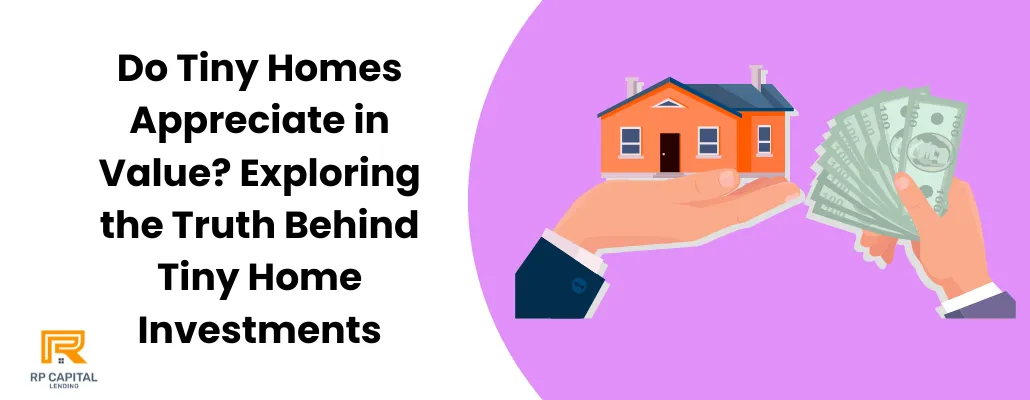Blog

Do Tiny Homes Appreciate in Value? Exploring the Truth Behind Tiny Home Investments
As the minimalist lifestyle continues to gain momentum, many people are considering tiny homes as a viable living option. But a pressing question remains: do tiny homes appreciate in value? Understanding the potential for appreciation is crucial for anyone looking to invest in these compact dwellings. Let's explore the factors that influence the value of tiny homes and provide insights into their market potential.
What is a Tiny Home?
A tiny home is a compact living space, typically under 400 square feet, designed to maximize efficiency and minimize environmental impact. These homes focus on simplicity and functionality, appealing to those who prioritize minimalism and sustainability. They come in various styles, from stationary structures on foundations to mobile units on wheels.
Features of Tiny Homes
Compact Design:
Efficient use of space with multi-functional areas.
Open floor plans to enhance the feeling of spaciousness.
Sustainable Materials:
Use of eco-friendly materials, such as reclaimed wood and recycled steel.
Energy-efficient appliances and fixtures to reduce environmental impact.
Mobility:
Many tiny homes are built on trailers, allowing for easy relocation.
Ideal for those seeking a flexible, nomadic lifestyle.
Customizable Options:
Interiors can be tailored to personal tastes, with options for custom cabinetry, built-in storage, and unique layouts.
Many builders offer various design packages to suit different preferences.
Energy Efficiency:
Incorporation of solar panels and energy-efficient systems.
Low utility costs due to smaller space and efficient design.
Factors Influencing Tiny Home Value Appreciation
Location:
Urban Proximity: Tiny homes located near cities or in popular tourist areas tend to appreciate more due to higher demand. Buyers often look for convenient access to work, entertainment, and amenities.
Desirable Neighborhoods: Just like traditional homes, tiny homes in safe, attractive neighborhoods with good schools and facilities are more likely to appreciate in value.
Quality of Construction:
Materials and Craftsmanship: Homes built with high-quality materials and skilled craftsmanship tend to hold their value better. Features such as durable siding, efficient insulation, and high-quality finishes can significantly impact the home's longevity and appeal.
Maintenance: Regular upkeep and maintenance ensure the home remains in good condition, positively influencing its market value.
Design and Features:
Modern, Efficient Designs: Tiny homes with modern aesthetics and smart, space-saving layouts are more appealing to potential buyers. Energy-efficient appliances, solar panels, and other eco-friendly features can also increase desirability.
Customization Options: Homes that offer customization options for buyers can attract a wider audience, enhancing their marketability and potential appreciation.
Market Demand:
Growing Interest in Sustainability: As more people embrace sustainable living, the demand for tiny homes continues to rise. This increased interest can drive up property values.
Economic Factors: Broader economic conditions and housing market trends also play a role in tiny home appreciation. During times of economic uncertainty, more affordable housing options like tiny homes may become more popular, potentially boosting demand and value.
Legal Regulations:
Zoning Laws: Regulations regarding where tiny homes can be placed vary widely by location. Areas with favorable zoning laws for tiny homes are likely to see higher appreciation rates.
Permits and Compliance: Ensuring that a tiny home complies with local building codes and regulations can positively impact its resale value. Buyers are more likely to invest in homes that meet legal standards.
FAQs About Tiny Homes and Their Value
1. Do tiny homes appreciate in value like traditional homes?
Yes, but the rate can vary. Factors such as location, quality, and market demand play crucial roles in determining appreciation.
2. What are the main benefits of investing in a tiny home?
Lower initial investment compared to traditional homes.
Reduced maintenance costs.
Potential for rental income in desirable locations.
3. Are there any financial drawbacks to owning a tiny home?
Limited financing options.
Potential zoning and regulation challenges.
Resale market may be narrower compared to traditional homes.
4. How can I increase the resale value of my tiny home?
Regular maintenance and upgrades.
Adding desirable features like solar panels or smart home technology.
Choosing a prime location for placement.
5. Can I get a mortgage for a tiny home?
It can be challenging, as many lenders view tiny homes differently than traditional homes. Alternative financing options, such as personal loans or RV loans, may be available.
Conclusion
While tiny homes may not appreciate at the same rate as traditional homes, they offer unique advantages and potential for value growth. By considering factors like location, design, and market trends, you can make an informed decision about investing in a tiny home.
RP Capital Lending is a d.b.a of RP Capital Partners Inc (NMLS # 2469193) | Privacy Policy
Copyright © 2022. All Rights Reserved.
Disclaimer: Loans only apply to non-owner occupied properties. Rates, terms and conditions offered only to qualified borrowers, may vary upon loan product, deal structure, other applicable considerations, and are subject to change at any time without notice.

